- The Bottom Line Up Front
- Overview of QuickBooks Online
- Overview of Puzzle.io
- The User Interface and Experience
- Core Accounting Features
- The Nitty Gritty: Automation and AI Capabilities
- Reporting and Analytics
- Integrations and Add-ons
- Pricing Structure
- Customer Support and User Resources
- Scalability and Business Suitability
- Data Security and Compliance
- Pros and Cons Summary
- Final Recommendation
Last Updated on May 3, 2025 by Ewen Finser
In the ever-evolving landscape of accounting technology, businesses have numerous options when choosing software that meets their financial management needs. As a CPA, I’ve tried more accounting softwares than I care to admit, and I keep coming right back to “old reliable.” QuickBooks Online has long dominated the accounting software market, particularly among small to medium-sized businesses. However, emerging platforms like Puzzle.io are quickly gaining attention due to their innovative integration of artificial intelligence. And from a technical standpoint, I have continuously been impressed with the niche and specific offering’s that Puzzle has showcased.
The Bottom Line Up Front
QuickBooks Online offers widespread adoption, an intuitive user interface, extensive integrations, and robust community support, making it ideal for businesses preferring an established solution. Puzzle.io leverages powerful AI-driven automation to minimize manual work, significantly reduce errors, and enhance strategic financial decision-making, ideal for tech-forward businesses seeking efficiency and innovation. The nature of your business and your specific goals will ultimately determine which accounting software best addresses your unique needs.
Overview of QuickBooks Online

QuickBooks Online, developed by Intuit, is the elephant in the room. It remains one of the most popular accounting platforms worldwide, boasting tens of millions of active users ranging from freelancers to sizable mid-market enterprises. Known for its user-friendly interface and reliable functionality, QuickBooks covers a vast spectrum of accounting operations, including invoicing, bill payments, bank reconciliation, expense tracking, inventory management, payroll, and financial reporting. Its strength lies in simplicity, widespread adoption, integrations with hundreds of third-party apps, and a robust online community offering extensive support.
Overview of Puzzle.io
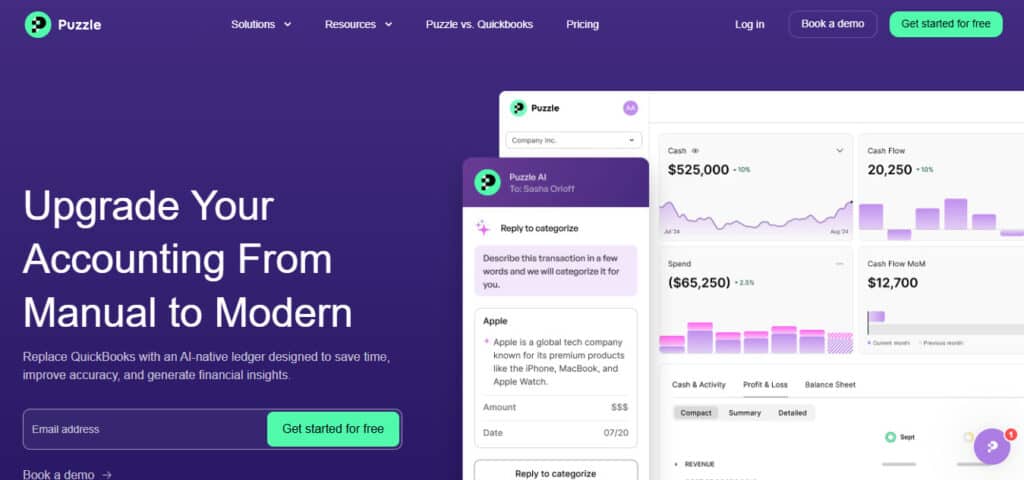
Puzzle.io positions itself as a groundbreaking accounting platform, primarily distinguished by its robust use of artificial intelligence to automate and streamline traditional accounting tasks. Built specifically for businesses looking to leverage cutting-edge technology, Puzzle.io handles bookkeeping, bank reconciliation, financial reporting, and invoice management, emphasizing minimal manual input. Puzzle’s AI-driven platform drastically reduces human error and saves significant amounts of time, enabling accountants and business owners to focus more on strategic decision-making rather than mundane bookkeeping.
The User Interface and Experience

QuickBooks
QuickBooks is known for its intuitive and straightforward user interface, with no other way to say it. That black, green, and gray dashboard is borderline nostalgic to accountants. Users find navigating the platform easy, even with minimal accounting know-how, due to its logical layout, clear labeling, and easy-to-access menus. The dashboard provides quick summaries of essential metrics like profit and loss, unpaid invoices, and recent transactions.
While it is friendly for novices, QuickBooks also offers depth for more experienced accountants, with the flexibility to dive deep into detailed financial analytics and reporting. I like to call this “taking the training wheels off” because if you want to make some seriously complicated journal entries because your business is niche, QB will typically let you. With that in mind, though, QuickBooks will also absolutely let you ruin your company’s books if you don’t know what you’re doing. With great power comes great responsibility!
Puzzle
Puzzle.io’s interface is clean, modern, and specifically designed to facilitate AI interactions. It prioritizes automation and simplification, aiming to provide a frictionless experience. The dashboard is streamlined, with AI-driven suggestions appearing proactively to guide users through accounting processes. For those unfamiliar with advanced accounting software, Puzzle’s approach is less intimidating, as the AI intuitively suggests next steps and corrections, creating a genuinely user-friendly environment.
Core Accounting Features
Both QuickBooks and Puzzle provide core accounting functionalities that you would expect from modern platforms. They include, but are not limited to:
· Invoicing
· Bank reconciliations
· Bill tracking
· Expense categorization
QuickBooks has had years to perfect its suite of features, including advanced payroll and inventory management options, which Puzzle.io is still developing. Personally, this is where I felt QBO trumps Puzzle, in that some instances it can handle a broader variety of businesses.
For instance, Puzzle is not set up to help general contractors run their business. Construction businesses have specific accounting rules they must follow, and Puzzle is not flexible enough to handle that different type of workload, while QBO can. I spoke with a team member from Puzzle, and he emphasized that Puzzle is more adept at handling subscription-based businesses or service related businesses, for example, and I agree.
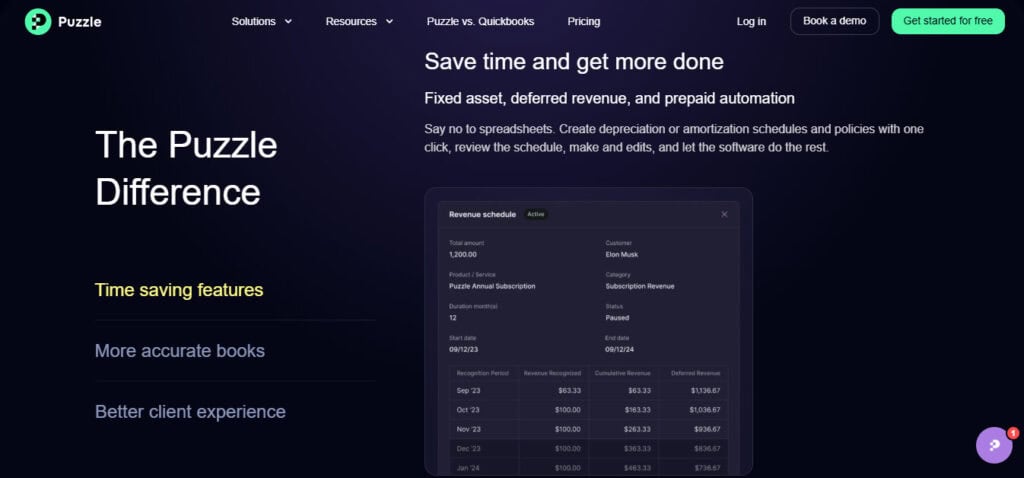
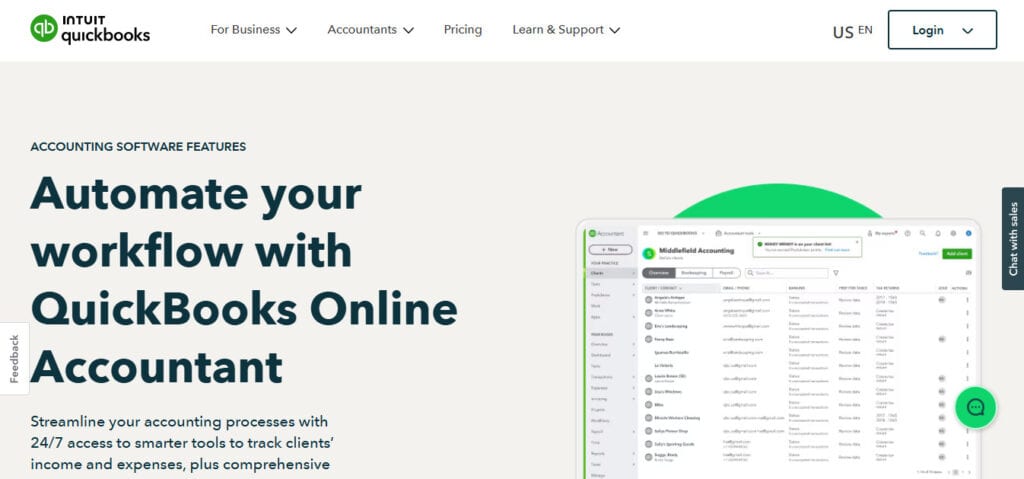
The Nitty Gritty: Automation and AI Capabilities
QuickBooks Online
QuickBooks offers basic automation capabilities, such as recurring invoices, payment reminders, and automatic bank feeds. Its AI features are relatively modest, primarily centered around categorization suggestions and anomaly detection. I like to think of it more as pattern recognition as opposed to AI that can think conclusively and figure things out when presented with new information. QuickBooks does automate many common tasks, but still requires substantial manual intervention and verification, making the platform somewhat traditional despite recent advancements.
Puzzle.io
Puzzle.io significantly outpaces QuickBooks in AI-driven automation. It leverages advanced artificial intelligence to proactively handle many routine and complex accounting tasks. Puzzle.io automatically categorizes transactions based on historical data, anticipates and corrects discrepancies, and can even provide predictive financial analytics to help users forecast cash flows and profitability. For businesses looking to minimize manual accounting work, Puzzle.io’s AI capabilities are a keystone.
Reporting and Analytics

QuickBooks Online
QuickBooks provides extensive reporting options, from basic profit and loss statements and balance sheets to sophisticated cash flow analysis and budget tracking. Users can customize these reports to suit specific business needs. However, generating deep insights or predictive analytics remains largely a manual process.
I’ve used QBO for years, and have always felt their reporting dashboard was clunky (the visuals, not that data itself within the ledger). I rarely use the onboard reports in QBO and prefer to build out my own in Excel, as they are easier to read for an untrained eye.
Puzzle.io
Puzzle.io utilizes AI not only to automate reporting but also to offer predictive insights. Its reporting system can forecast cash flow, identify financial trends, and suggest strategic actions based on data-driven insights. Another thing that absolutely floored me was Puzzle’s UI and reporting dashboard. It was sleek, polished, and well presented, and the information that it needed to display was apparent and readily available. Some software engineer out there spent a ton of time obsessing over the presentation of the graphics, and it definitely shows.
Integrations and Add-ons
QuickBooks Online
QuickBooks boasts over 650 integrations with a broad spectrum of third-party applications, including CRM systems, payroll solutions, time tracking, and e-commerce platforms. Popular integrations like Shopify, HubSpot, Stripe, and PayPal allow users extensive flexibility in managing their business ecosystems. In fact, I have yet to find a third-party application that DIDN’T connect to QBO. Even a local credit union with one branch located in my rural hometown connects with QBO via an API. QBO’s connectivity is ubiquitous, which is super convenient for business owners who don’t want to manually book all of their transactions.
Puzzle.io
Puzzle.io currently supports fewer integrations compared to QuickBooks. However, it is rapidly expanding its ecosystem to include essential integrations with popular payment providers, payroll services, and e-commerce platforms. The company prioritizes quality over quantity, ensuring integrations leverage AI capabilities to maximize efficiency and accuracy. I expect many additional connections to come on quickly as Puzzle scales.
Pricing Structure
QuickBooks Online
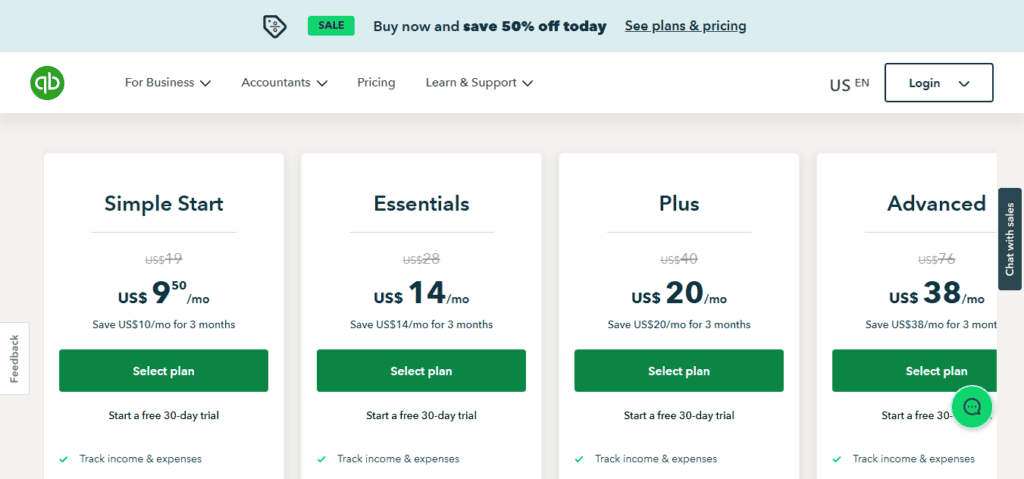
QuickBooks offers tiered subscription plans:
- Simple Start: $30/month, basic invoicing, expense tracking, and reporting for single users.
- Essentials: $60/month, added capabilities like bill management and time tracking for multiple users.
- Plus: $90/month, includes inventory management and project profitability tracking.
- Advanced: $200/month, enhanced reporting, dedicated support, and workflow automation designed for larger or growing businesses.
QuickBooks frequently offers discounts for new users, making initial adoption cost-effective. However, the list above doesn’t paint a fair picture, because if you add Payroll, for instance, it can be up to $7 per employee plus the base rate. It adds up FAST and can burn up funds quickly.
Puzzle.io
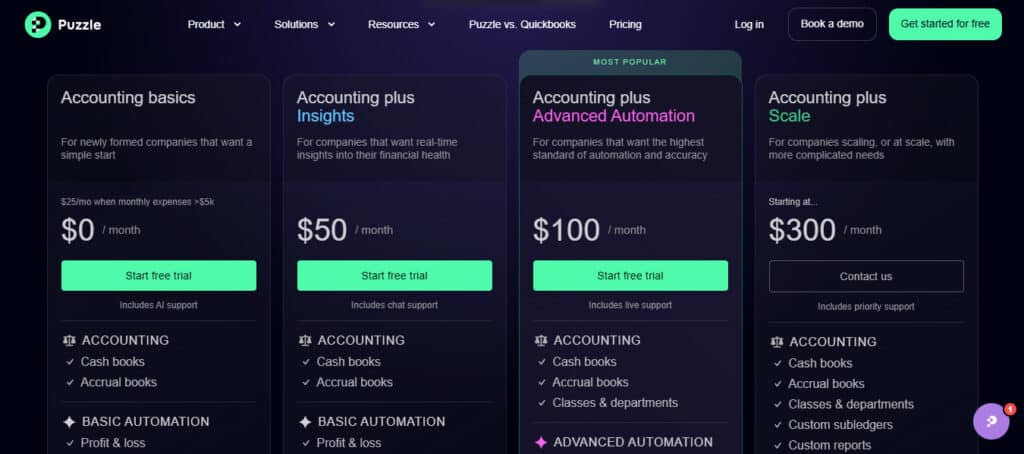
Puzzle.io’s pricing model emphasizes simplicity and scalability:
- Free: There is a $0 plan for businesses that just want to get their feet wet, but automation is limited.
- Starter Plan: Approximately $50/month, designed for freelancers and very small businesses, offers full AI accounting automation.
- Business Plan: Approximately $100/month, includes enhanced analytics, multiple user access, and more robust AI-driven reporting features.
- Enterprise Plan: Custom pricing tailored for larger businesses requiring extensive features, specialized AI analytics, and dedicated account management.
Puzzle.io’s higher initial cost compared to QuickBooks’ lower-tier plans is offset by significant labor savings due to enhanced automation.
Customer Support and User Resources
QuickBooks Online
QuickBooks has invested significantly in user support resources. They provide comprehensive customer support options, including live chat, phone support, and extensive online documentation. QuickBooks also maintains a highly active online community where users share solutions and advice. Additionally, users can access abundant resources, including video tutorials, webinars, certification courses, and user forums.
However, a recurring criticism of QuickBooks has been inconsistent customer service response times and varying support quality, especially during busy periods like tax seasons. Some users find themselves navigating through self-help resources rather than receiving timely human assistance.
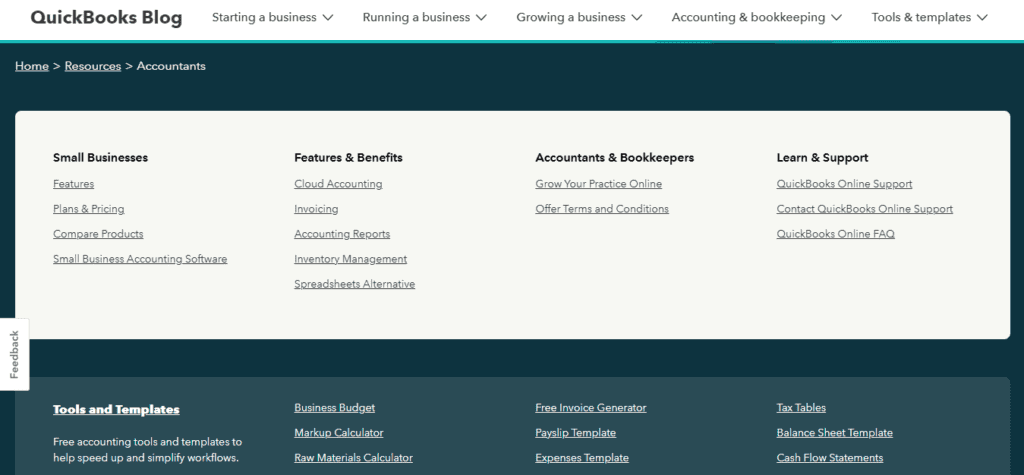
Puzzle.io
Puzzle.io offers customer support primarily through live chat, email, and scheduled consultations with customer success managers. I personally like having this one, on one approach, as QBO typically reserves this for higher-paying tiers. While Puzzle.io’s support resources are not yet as vast as QuickBooks’, the company focuses heavily on providing personalized, responsive assistance, capitalizing on its smaller user base to deliver quicker, more targeted support.
Furthermore, Puzzle.io leverages its AI capabilities to proactively identify potential user issues. This predictive approach means that many problems can be preemptively addressed without users even needing to seek support actively, enhancing overall user satisfaction and reducing frustration.
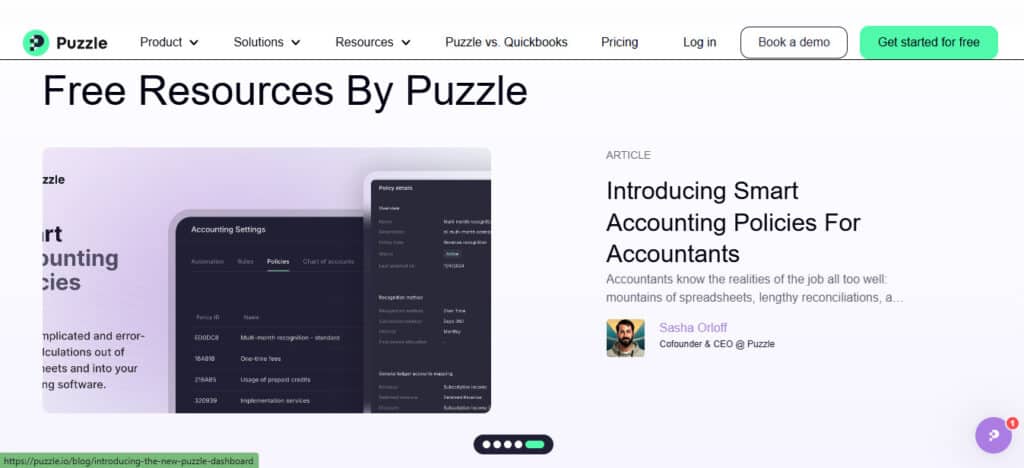
Scalability and Business Suitability
QuickBooks Online
QuickBooks excels at catering to small and medium-sized businesses. The software easily scales from solo entrepreneurs up to mid-sized companies with multiple departments, offering features that adjust with a business’s evolving needs. However, QuickBooks has limitations at the higher end of the mid-market. Companies with complex accounting demands, such as sophisticated multi-entity consolidations, detailed departmental budgets, or advanced financial modeling, may eventually outgrow QuickBooks and require more robust ERP solutions
Personally, I see QBO being phased out as companies pass the $100MM threshold, and they usually transition to Sage, SAP, or Oracle. That’s just how diverse QB is, it can field a $40K a year freelancer, or a small hospital network, which in my opinion is super impressive!
Puzzle.io
Puzzle.io, by design, positions itself as scalable from inception. Its AI-driven architecture enables seamless adaptation to increasingly complex accounting needs as businesses grow. Puzzle handles multi-entity management, sophisticated analytics, and strategic forecasting far more intuitively than QuickBooks, making it particularly appealing for startups and tech-savvy companies anticipating rapid growth or complex operational structures.
However, since Puzzle is relatively new to the market, larger enterprises or highly regulated industries might initially prefer established brands like QuickBooks due to their proven stability and long-standing reputation.
Data Security and Compliance
QuickBooks and Puzzle
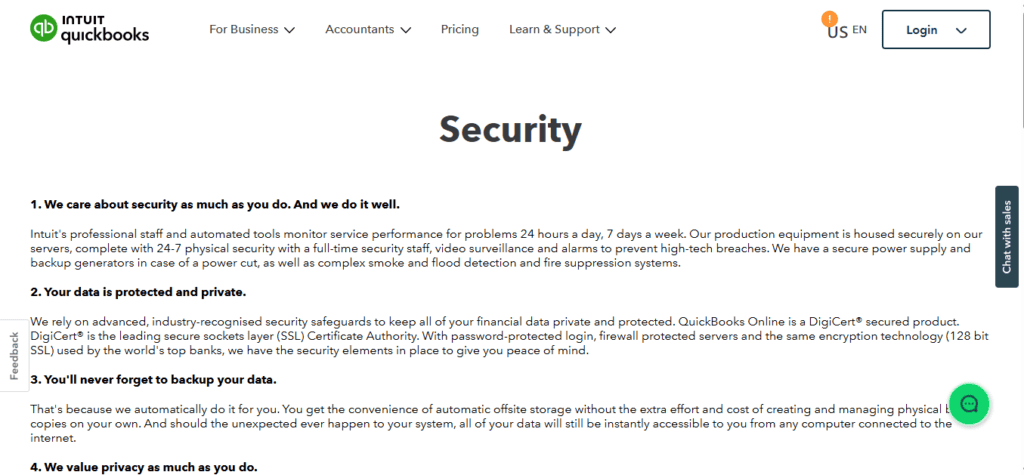
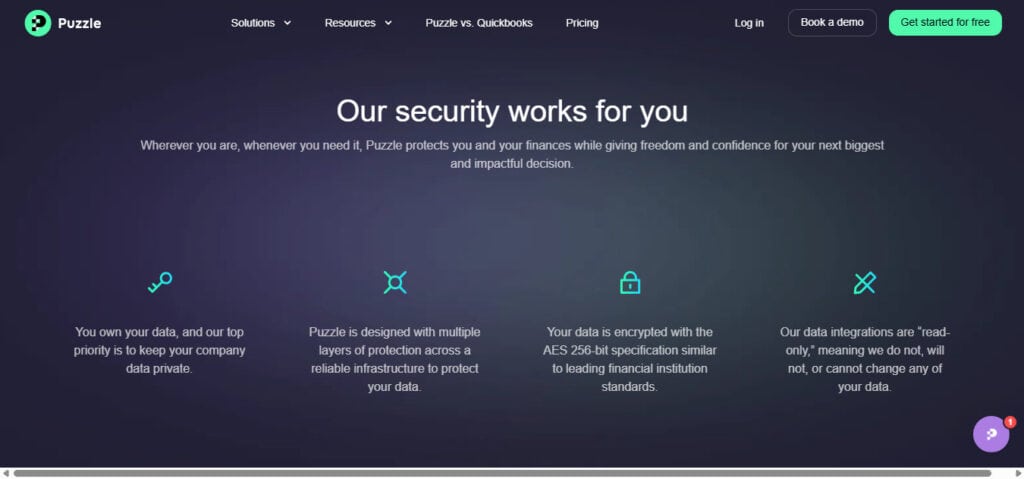
Intuit, the parent company of QuickBooks, has a robust infrastructure dedicated to data security. QuickBooks employs bank-grade encryption, multi-factor authentication, and regular security audits to safeguard sensitive financial data. It adheres strictly to GDPR, CCPA, and financial industry compliance standards, making it trustworthy for sensitive financial information handling. Puzzle.io places a similarly high emphasis on data security, utilizing advanced encryption protocols, regular third-party audits, and comprehensive security frameworks. Puzzle also incorporates AI-powered security features, such as anomaly detection and proactive fraud monitoring, adding another layer of protection. Their modern infrastructure is built with the latest compliance regulations in mind, offering assurance even to highly security-conscious industries.
Pros and Cons Summary
QuickBooks Online
Pros:
- Intuitive and user-friendly interface.
- Vast user community and extensive third-party integrations.
- Strong core accounting features like payroll, inventory, and project management.
- Widely trusted and recognized brand.
Cons:
- Limited AI automation; tasks still require manual oversight.
- Customer support quality can vary significantly.
- May lack sophistication for high-growth or complex enterprises.
Puzzle.io
Pros:
- Superior AI automation significantly reduces manual accounting tasks.
- Proactive, AI-driven analytics and financial forecasting.
- Highly scalable architecture suitable for rapid-growth businesses.
- Personalized and responsive customer support.
Cons:
- Fewer integrations and third-party applications compared to QuickBooks.
- Relatively new, lesser-known in the broader accounting market.
- Higher initial costs compared to QuickBooks’ entry-level plans.
Final Recommendation
When choosing between QuickBooks and Puzzle.io, the best choice depends largely on your specific business needs and strategic priorities.
Choose QuickBooks Online if:
- You prefer a well-established platform with extensive resources.
- Your business relies heavily on third-party integrations.
- You prefer gradual automation and have existing familiarity with QuickBooks.
- Your accounting needs are currently straightforward and unlikely to become extremely complex soon.
Choose Puzzle.io if:
- You value cutting-edge AI automation and predictive analytics.
- Your business anticipates rapid growth or has complex multi-entity financial requirements.
- You prefer personalized support and proactive issue resolution.
- You want to significantly reduce the time spent on manual accounting tasks.
Both QuickBooks and Puzzle.io offer robust features tailored to different segments of the accounting software market. QuickBooks remains the trusted choice for businesses looking for comprehensive integrations and an established brand, while Puzzle is the forward-thinking, AI-driven alternative designed for modern businesses that prioritize automation and scalability.
As the accounting industry evolves, platforms like Puzzle.io are likely to set new standards, prompting traditional solutions like QuickBooks to adapt further. The right choice today ultimately aligns with your strategic vision for your business’s future.

